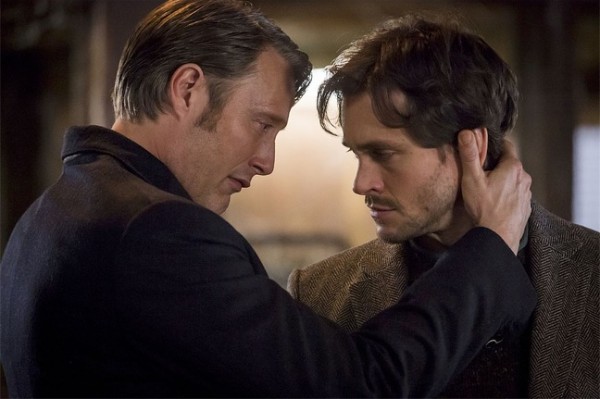SPOILERS for the series finale of Hannibal.
Thomas Harris’ quartet of books about sophisticated and Machiavellian murderer Hannibal Lecter were the best kinds of pulp, blending detective thrillers with a sense of the Grand Guignol. Though entertaining and excellent in their own right, the books carried the all too familiar stigma that most artistic endeavors branded as “horror” must deal with. It wasn’t until Jonathan Demme’s adaptation of Harris’ second book, The Silence of the Lambs, that general audiences began to glimpse the elegance and maturity lurking behind Hannibal Lecter and his blood-splattered world, even though Michael Mann had given us a delicious and filling appetizer with his version of Harris’ Red Dragon under the title of Manhunter. Unfortunately, the following cinematic endeavors failed to resonate as strongly with the majority of audiences, and Hannibal Lecter seemed to regress back into the realm of unremarkable monsters.
Then, Bryan Fuller and his team resurrected the world’s favorite cannibal in a television series that was nothing but elegance, presenting Hannibal and his universe as if it was an ongoing dreamscape that often veered into nightmarish beauty. The creators took a bold approach by starting the series’ story before any of the source material, giving us an opportunity to view Hannibal as a monster walking among men. It was refreshing in every aspect, aided by actor Mads Mikkelsen’s bravura performance of the character, making him the chilliest and most debonair iteration ever put to film.
Fuller also decided to make the series’ story about the relationship between Hannibal and FBI profiler Will Graham, and due to legal issues regarding the character of Clarice Starling (famously portrayed by Jodie Foster), that character’s twisted love story with Hannibal became Will’s. It was a risky gamble, but paid off in spades. Over the course of the series, Will became a living embodiment of Nietzsche’s famous quote, “Battle not with monsters, lest ye become a monster,” while also becoming swept up into the darkest and most intimate of romances. Hugh Dancy brought both uncertainty and resolve to his portrayal of Will Graham, and brought forth a tragic sympathy that the character never quite possessed in other incarnations.
As the series grew past being a police procedural designed by Hieronymus Bosch, the show began to incorporate more and more from Harris’ original works. The stroke of genius though was never pledging fealty to the novels, allowing the writers to play with familiarity in order to surprise and shock the audience. Characters’ fates were interchanged, some were given new genders or races, and even Will Graham himself was the first to don Hannibal’s infamous facemask at the end of the first season. The show struck the perfect balance between adaptation and reinvention, and has set a challenging standard when it comes to similar projects.
It’s baffling that the show found its home on network television in America. Hannibal is a show with a distinctly European influence, often devoting large chunks of an episode to two people sitting across from each other and talking. Though some may find that inherently uneventful, Hannibal was a show that made even the most banal of situations extraordinarily cinematic. It’s another notch in television’s belt when it comes to trouncing mainstream film as the go-to source for adult storytelling.
As Hannibal faced its inevitable cancellation, the story came to a devastatingly gorgeous finale, with Will and Hannibal working together to eliminate serial killer Francis Dolarhyde. Wounded and accepting of the monster he became, Will embraced Hannibal as the two plummeted off a seaside cliff, most likely to their deaths. Though talk continues of a possible continuation of this story (Bryan Fuller adamantly wants to do a feature film), if this is the last time we see Hannibal Lecter in a long time, I’m more than happy. The show managed to do on a grander scale what Jonathan Demme’s 1991 film did: show audiences that these kinds of vicious horror stories are not always worthy of dismissal. In the right hands, they can be just as contemplative, visually arresting, and well-performed as any Oscar-winning movie. For that alone, we owe Hannibal our thanks.
If you like how stupid I am, follow me on Twitter and listen to my podcast.
